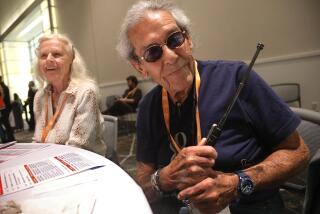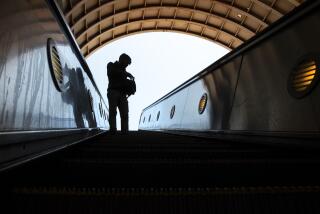Security Would Slow Puget Sound Commute
- Share via
SEATTLE — What would happen if a terrorist detonated a bomb aboard the 6:20 a.m. ferry from Bainbridge Island to Seattle? It’s one of the state’s busiest runs, with an estimated 2,500 commuters riding it at that time every weekday.
The scenario has occurred to ferry-rider Bob Hope, 48, an insurance broker from Winslow. “That would be very ... big,” he says, choosing his words carefully. By “big,” he means awful. Disastrous. Hope doesn’t find the subject easy to talk about.
But such speculations abound on the normally placid waters of Puget Sound as Washington State Ferries -- the largest ferry fleet in the nation -- prepares to implement new security measures that could mean X-ray machines, random searches and identification checkpoints. Security at ferry terminals could soon resemble that at airports.
As ferry riders weigh the pros and cons of this, the prevailing fear among many is that it could mean a fundamental change in the way commuters schedule their time. Now, boarding a ferry is almost as easy as getting on a city bus. More security could mean longer wait times and, consequently, longer commutes.
The prospect has created a buzz among regular ferry-riders, evoking everything from patriotic acceptance to grudging resignation. Many commuters, such as Veronica Smith, 60, seem to accept such developments as “a fact of life” after Sept. 11.
“We can’t let our guard down now,” Smith says, waiting for the next ferry to Bremerton. “We let our guard down before and look what happened.”
The ferry system is one of the major people-movers in the region. New York City has its subway system. Puget Sound has the Washington State Ferries, a fleet of 25 vessels carrying 26 million passengers a year to 20 ports of call, from Tacoma to Sidney, British Columbia. Thousands of workers commute daily to Seattle from places such as Bremerton, Bainbridge Island and Vashon Island.
On Tuesday, the Homeland Security Department announced new security rules that affect the whole maritime industry, including 10,000 ships and 5,000 coastal facilities. U.S. Transportation Secretary Norman Y. Mineta and others have said America’s ports are more vulnerable to terrorist attacks than any other part of the transportation industry.
The new rules don’t mandate car and passenger screening on ferries, but they do require that ferry operators come up with a new, tighter security plan that could include such screenings.
Washington State Ferries must come up with a plan by the end of the year and implement it by next July. The agency must also figure out how to pay for the new equipment and security personnel that will most likely be needed, said spokeswoman Susan Harris. Right now, officials don’t know where the money will come from, but the possibility of a fare increase has been floated.
One estimate put the cost of new security at $20 million, a price tag partially offset in June when the Homeland Security Department awarded a $9.4 million grant to Washington State Ferries.
Harris said the agency doesn’t know yet how the money will be spent, but the possibilities include bomb-sniffing dogs, X-ray machines, security personnel to perform searches, sentries, reinforced doors to wheelhouses and engine rooms, and barricades separating passengers and nonpassengers at the terminals.
Ferry officials, not wanting to foment alarm, have played down the changes and potential for delays. Scott Davis, safety manager for the fleet, said, “We have to balance the need for security with the need for efficient and effective mass transportation.”
But Davis also said security such as the kind at airports is “not too far-fetched” for the ferry system.
“The reality is that Washington State Ferries possess some vulnerabilities,” Davis said. “We move a lot of people and a lot of vehicles. The idea is to prevent something from happening; prevention is always the preference.”
Hope, the insurance broker from Winslow, says the new measures, while well-intentioned, could amount to “overkill.” After all, most ferry commuters live in the same towns and know one another. “They’re our neighbors,” he says. And the government, he says, hasn’t made the case that there is “a real security threat” on the ferries.
That kind of skepticism is counterbalanced by talk of worst-case possibilities -- the kind of talk that, as terrorist attacks have played out around the world, seems to come to the fore in places where large numbers of people congregate.
And, among ferry riders up and down the Sound, the “what if” scenarios have their own particulars: What if someone rams a small boat with explosives into a crowded ferry, just like the jetliners crashing into the World Trade Center? What if someone drives a car bomb on board? Or worse, a “dirty” bomb, which would release radioactive material over a small area?
“No doubt, these ferries would be a good target,” says Shadow Woodfork, 30, of Puyallup. Woodfork regularly rides a ferry to visit his sister on Bainbridge Island. He says he doesn’t mind the idea of a delay.
“If it’ll only take 15 more minutes to keep the ship from blowing up, I can deal with it,” he says. “It’ll be a pain, but I can deal with it.”
One man, Pat Claudon, 40, of Port Orchard, says security delays would change his whole way of life. Claudon, a construction worker, commutes to Seattle every weekday and says his life is so full that he barely makes the ferry to and from work.
“I’m always within five minutes,” he says, adding, “there are a lot of people just like me.”
Security delays would mean waking up earlier and getting home later. The idea of it makes Claudon groan. “It’s not like I don’t have enough to deal with; now I’m looking at standing in line to go to work. I don’t need that, I really don’t.”
More to Read
Sign up for Essential California
The most important California stories and recommendations in your inbox every morning.
You may occasionally receive promotional content from the Los Angeles Times.













